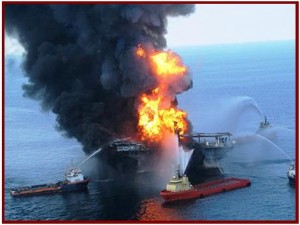
The $1 billion in civil penalties for violations of the Clean Water Act is a record amount that exceeds last year’s $70 million civil penalty paid by MOEX Offshore.
Transocean Deepwater, the operator of the Deepwater Horizon drilling rig in the Gulf of Mexico, will plead guilty to violating the Clean Water Act and pay a total of $1.4 billion in civil and criminal fines for its conduct during the largest oil spill in U.S. history.
The criminal charges and a proposed “partial” civil consent decree to resolve the U.S. government’s claims against Transocean were filed today in U.S. District Court in the Eastern District of Louisiana.
Transocean Deepwater signed a cooperation and guilty plea agreement with the government, also filed today, admitting its criminal conduct. As part of the plea deal, Transocean Deepwater has agreed, subject to virtually certain court approval, to pay $400 million in criminal fines and penalties and to continue its on-going cooperation in the government’s criminal investigation.
In addition, as part of the proposed partial civil consent decree, Transocean Ocean Holdings LLC, Transocean Offshore Deepwater Drilling Inc., Transocean Deepwater Inc. and Triton Asset Leasing GMBH have agreed to pay an additional $1 billion to resolve federal Clean Water Act civil penalty claims for the massive, three-month-long oil spill at the Macondo Well and the Transocean drilling rig Deepwater Horizon.
Under the civil settlement, the Transocean defendants also must implement court-enforceable measures to improve the operational safety and emergency response capabilities at all their drilling rigs working in waters of the United States.
“This resolution of criminal allegations and civil claims against Transocean brings us one significant step closer to justice for the human, environmental and economic devastation wrought by the Deepwater Horizon disaster,” said Attorney General Eric Holder in a statement. “This agreement holds Transocean criminally accountable for its conduct and provides nearly a billion dollars in criminal and civil penalties for the benefit of the Gulf states.”
According to court documents on 20 April 2010, while at the Macondo well site in the Gulf of Mexico, the Deepwater Horizon rig experienced an uncontrolled blowout and related explosions and fire, which resulted in the deaths of 11 rig workers and the largest oil spill in U.S. history. In agreeing to plead guilty, Transocean Deepwater admits that members of its crew onboard the Deepwater Horizon, acting at the direction of BP’s “Well Site Leaders” or “company men,” were negligent in failing fully to investigate clear indications that the Macondo well was not secure and that oil and gas were flowing into the well.
The DOJ claims the criminal resolution will benefit the Gulf region. Under the order presented to the court, $150 million of the $400 million criminal recovery is dedicated to acquiring, restoring, preserving and conserving – in consultation with appropriate state and other resource managers – the marine and coastal environments, ecosystems and bird and wildlife habitat in the Gulf of Mexico and bordering states harmed by the Deepwater Horizon oil spill.
This portion of the criminal recovery will also be directed to barrier island restoration and/or river diversion off the coast of Louisiana to further benefit and improve coastal wetlands affected by the oil spill. An additional $150 million will be used to fund improved oil spill prevention and response efforts in the Gulf through research, development, education and training.
The civil settlement secures $1 billion in civil penalties for violations of the CWA, a record amount that significantly exceeds last year’s $70 million civil penalty paid by MOEX Offshore 2007 (Read AutoInformed on $90 Million MOEX Settlement for Deepwater Horizon Oil Spill), a 10% partner with BP in the Macondo well venture. The $1 billion civil penalty is subject to the Resources and Ecosystems Sustainability, Tourist Opportunities and Revived Economies of the Gulf Coast States Act of 2012, aka Restore Act, which provides that 80% of the penalty will be to be used to fund projects in and for the Gulf states for the environmental and economic benefit of the region.
Under the civil settlement, the Transocean defendants must also observe various court-enforceable strictures in its drilling operations, aimed at reducing the chances of another blowout and discharge of oil and at improving emergency response capabilities. Examples of these requirements include certifications of maintenance and repair of blowout preventers before each new drilling job, consideration of process safety risks, and personnel training related to oil spills and responses to other emergencies. These measures apply to all rigs operated or owned by the Transocean defendants in all U.S. waters and will be in place for at least five years.

